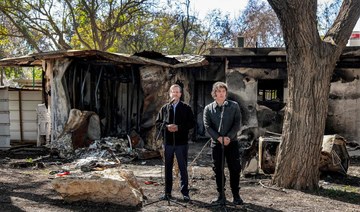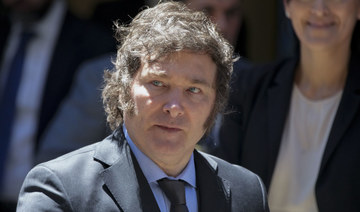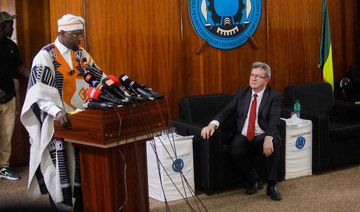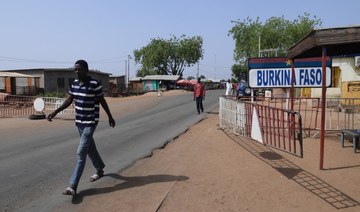MANILA: The problem of how to handle Daesh fighters and their families looking to return to their homelands is a conundrum facing many countries, including the Philippines. On Thursday, Filipino officials said that Filipinos who had committed crimes abroad must face the consequences.
Reports suggest there were Filipino nationals among the thousands of suspected Daesh members who surrendered to US-backed forces following the extremist group’s territorial defeat in Syria.
Presidential Adviser on Anti-Terrorism Benjamin Defensor Jr. said the government was waiting for verification of this information, noting that people who went to the Middle East to train with Daesh were typically not just from the Philippines, but from other areas of the Southeast Asian region too, particularly areas where the militant extremist group Jemaah Islamiyah (JI) has a strong presence.
“These people, the so-called terrorists, have different passports — Indonesian, Malaysian, Thailand, or whatever. But when they come here, they have Philippine passports, so they are referred to conveniently as Filipinos. But these people don’t speak Tagalog at all,” Defensor said in an interview on the sidelines of the PROTECT 2019 conference.
A senior Philippine military official, who asked to remain anonymous, told Arab News the government has no data on how many Filipinos joined Daesh in Syria.
“It’s hard hard to know (the number), because many travel as overseas foreign workers (OFWs), while others are already there, and they get radicalized then join (Daesh),” he said. He went on to claim that while there were some Filipinos who had joined Daesh, they were “not so many” and “not as many as Indonesians and Malaysians.”
Defensor stressed that the Philippines authorities want clarification on the crimes the Filipinos are alleged to have committed with Daesh.
“If they did something out of their own volition — say, a criminal activity — then they have to answer for their actions,” Defensor said. “If you commit terrorism, everybody is authorized to go after you.”
On the question of whether to allow Filipino Daesh members to return to their homeland, Defensor said that would be decided on a case-by-case basis.
“It depends on their background,” he said. “First we have to (verify) who they really are, then we will decide. We cannot just bring them back. They might be faking their identities just so they can get out of Syria.”
In January, the Syrian Democratic Forces (SDF) press office posted images on social media of identification cards acquired from three Filipinos who were among suspected Daesh fighters and families who surrendered or were captured in Baghouz. The cards belonged to Mohammad Reza Kiram, a known Daesh recruiter; his wife Ellen Jen Barriga; and Althea Jil Lopez.
Kiram — also known as Abdul Rahman Al-Filipini — traveled to Syria with his wife and daughter in 2015. Police believe he was responsible for the Zamboanga bus bombing in 2012.
In 2016, Kiram along with Malaysian Rafi Udin and Indonesian Muhammad Saifuddin — who also uses the aliases Abu Walid and Mohammed Karim Yusop Faiz — appeared in a Daesh propaganda video in which they beheaded three captives dressed in orange jumpsuits. In that same video, Kiram urged individuals in Southeast Asia to join Daesh. In August 2018, the US declared that Kiram, Udin, and Saifuddin were Specially Designated Global Terrorists (SDGT).
The senior official said officials from the Philippines are coordinating with agencies and authorities abroad regarding the matter.
On how the government will treat those Filipinos who became Daesh members in Syria, the source said: “There is no one-size-fits-all (answer). We have to determine the circumstances of each and every case, and then of course we will refer that to legal.”
Rikard Jalkebro, a security expert from the School of International Relations at the University of St. Andrews in Scotland, told Arab News that governments have to follow the laws of their individual countries when deciding how to deal with Daesh fighters being held by Syrian forces.
“If there’s no law against joining terrorist organizations then it’s problematic,” he said. “They should be vetted somehow, but it’s difficult getting evidence of what they have done. Morally, it’s a different story. They’re in limbo a bit. With the Europeans, some of them have dual citizenship and (the governments) want to revoke their European (one).”
Another idea, Jalkebro suggested, is to put those alleged to have committed crimes against humanity or war crimes on trial. However, he pointed out, that solution also comes with its own set of problems.
“Who will house them all? You can’t bring all of them to the Hague,” he said, adding that such trials could take years, and cost a great deal of money.
“But, at the same time, you have to ask why they decided to go there in the first place. You can’t join a terrorist organization like Daesh and change your mind,” he said. “Well, you can, but those who have committed atrocities should not be allowed (to get away with it),” Jalkebro continued.
He claimed that some foreign Daesh members are “relatively innocent.” Many from Central or Southeast Asia, he said, had gone to Syria for financial reasons, while the majority of Europeans had gone for ideological reasons and wanted to live in a “true” Islamic state.
He suggested the Philippines should prosecute returning Daesh members “if there is evidence they have committed crimes.” He noted that Filipino extremists had previously returned from Afghanistan and Iraq and used their new “know-how and tactics” to “continue the struggle” in Mindanao.

























